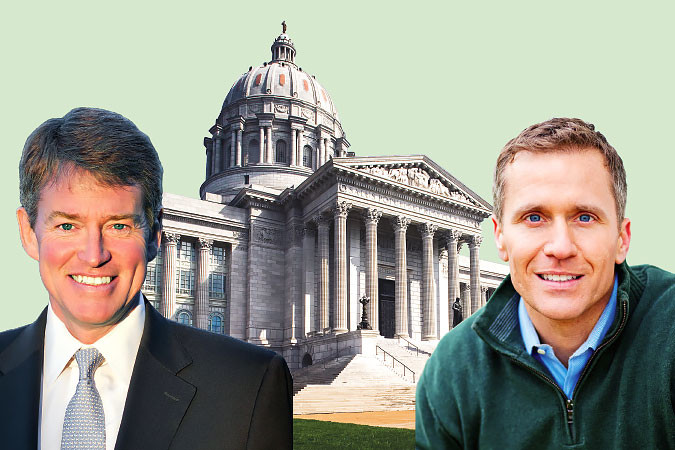YOUR BUSINESS AUTHORITY
Springfield, MO
YOUR BUSINESS AUTHORITY
Springfield, MO

Last edited 9:39 a.m., Oct. 27, 2016
As Nov. 8 approaches, there are two names and one question on most Americans’ minds.
But in Missouri, there are names other than Hillary Clinton and Donald Trump firing up conversation and campaign coffers. Namely, the two candidates vying for the state’s top seat: Eric Greitens and Chris Koster.
Democrat Koster is winning the campaign funding battle, but Republican Greitens is making a late surge.
In October quarterly reports filed Oct. 17 with the Missouri Ethics Commission, Koster reported cash on hand of $6.6 million as of Sept. 30, compared to Greitens’ $2.7 million. In the overall campaign cycle, Koster’s $22.3 million tally narrowly beat Greitens’ $22.1 million raised.
However, Greitens has been busy the last three months filling his war chest to the tune of nearly $4.2 million compared to Koster’s $3.3 million.
The total amount raised between both candidates – $30.7 million – would rank Missouri among the most expensive gubernatorial campaign races of all time, according to Elizabeth Dudash-Buskirk, associate professor of communication at Missouri State University.
“That’s an astronomical number,” she said. “The reason that’s important is Missouri is a red state looking to turn blue. It’s been a bellwether state and a swing state, but we’ve never seen it completely flip as far as Democrat and Republican voters are concerned.”
Outside interest
The battle for the state capitol has drawn interest from non-Missouri residents. Both campaigns received third-quarter donations from Florida to California to New York, and the candidates drew interest from national party leaders.
Clinton’s camp announced Oct. 17 a $500,000 contribution would be made from the Hillary Victory Fund to help Koster and fellow Democrat Jason Kander – running for incumbent Sen. Roy Blunt’s seat – win their respective election bids in November. Greitens, a political outsider and former Navy SEAL, received $1.95 million in July from super PAC SEALS for Truth – reportedly the single largest political contribution in Missouri election history.
MSU’s Dudash-Buskirk said the potential for shakeup is driving outside interest in Missouri’s election.
“If you have a governor who flips and becomes Republican or a governor who is a Democrat and some state house movement occurs, you have a different relationship with the federal government,” she said. “That’s why the national scene is paying attention to our governor’s race.”
Springfield’s business community didn’t shy away from contributing to their favored candidates during the quarter ended Sept. 30. Among roughly 100 donors, Gardner Capital President Mark Gardner and Integrity Home Care each contributed $10,000 to Koster’s campaign, while Digital Monitoring Products chipped in $75,000 for Greitens.
According to third-quarter filings, Greitens came out ahead of Koster in Springfield, raising $202,759 across 33 contributions. Koster, who’s no stranger to public office, had more than double the contributors but half the tally in the quarter.
Little trickles down
Compared to the third-quarter contributions Greitens and Koster netted from Springfield – a total of nearly $308,000 – far less money was spent by the campaigns in the southwest Missouri area.
Koster’s campaign spent roughly $1,200, about $881 of which was compensation for a single campaign worker. Other spends were made at Hotel Vandivort, Big Mommas Coffee and Espresso Bar and Price Cutter, according to MEC reports.
Greitens’ campaign spent around $36,500 locally, with about $33,450 going to a dozen campaign workers.
Other than occupancy expenses of $650 paid to Brentwood North LLC, most of the payment to area businesses ended up in the cash drawers of fast food restaurants and office supply stores.
The businesses that cashed in the most on the election are primarily media agencies outside Missouri.
Greitens’ campaign racked up nearly $4 million, or 85 percent of the money spent during the reporting period, on media with Sherman Oaks, California-based Target Enterprises. Koster spent nearly $3.3 million with Washington, D.C.-based Canal Partners Media LLC for advertising.
With November in sight, Dudash-Buskirk said candidate strategies rely on name recognition and party-line voting.
“Really what it comes down to are the ads,” she said. “They are trying to out-message each other, not in terms of the message but in the number of times they can get it out.”
In a state where major population centers such as Kansas City and St. Louis often decide election outcomes, Dudash-Buskirk said most candidates don’t vie to win votes in Missouri’s third-largest city.
“They don’t see it as a place to do much campaigning,” she said. “They believe people here are set in their ways.”
Dudash-Buskirk points to Sen. Claire McCaskill’s 2006 congressional win as an example of why candidates should consider the Queen City a worthwhile campaign stop.
“She campaigned here a lot and won a seat she wasn’t supposed to have, based on conventional wisdom,” Dudash-Buskirk said of McCaskill.
“If I were advising the campaigns, I’d tell them to spend more time and a little more money in Springfield.”